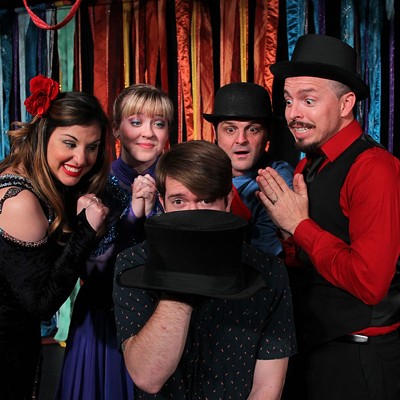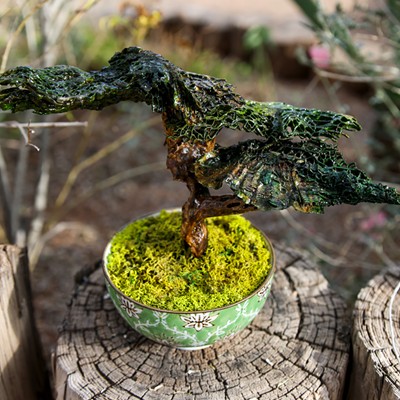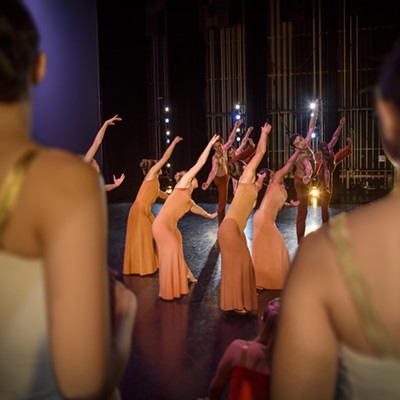There are some things—particularly traditions relating to the holidays—that just shouldn't be messed with. These sacrosanct things, which vary from person to person and family to family, come to have a special meaning because of their associations, or even simply because of the longevity of their presence. It's like colorizing Miracle on 34th Street or It's a Wonderful Life. It's just not right.
In a nod toward spreading some holiday cheer, Live Theatre Workshop is presenting Holiday Memories, an adaptation of two short stories by Truman Capote by Russell Vandenbroucke. Both of the stories are semi-autobiographical memories of Capote's childhood when he lived with some distant relatives in rural Alabama when he was 7 or 8 years old. Both also focus on young Buddy's relationship with one of the older cousins with whom he lives, Miss Sook, a woman in her 60s, who, unlike the other members of the household, finds great joy in Buddy's presence. They provide entertaining company for each other, the elder cousin being "simple," devoid of the intellect and education that often separates adults and children. She is herself, in fact, "still a child," a grown-up Capote states in one of the stories. They are fast friends.
Both of these stories are wonderfully evocative of the time Capote spent with these relatives, recalled years afterward through the filter of Capote's own maturation. Capote's memories are shared in these wonderfully well-wrought pieces with delicacy and sweetness and great love and appreciation of how his relationship with Miss Sook has enriched his life.
The first story, "The Thanksgiving Visitor," focuses on a Thanksgiving when Miss Sook invites to dinner a schoolmate of Buddy's who bullies him mercilessly. This appalls Buddy, but Miss Sook thinks that this is just the thing that will help ease the difficulties between the boys. There is an incident that disrupts the occasion, and Miss Sook uses the incident to give Buddy some heartfelt instruction in the way to treat others.
The second story is "A Christmas Memory," in which an adult Capote remembers with great affection the activities with Miss Sook in the weeks leading up to Christmas: making fruitcakes to send to a long list of folks they think might appreciate them, including President Roosevelt; tromping deep into the woods to cut down a Christmas tree and then making ornaments to decorate it; and making presents for each other, kites, which they relish flying together in the warm sun when the wind picks up on Christmas Day.
Now, here's the thing. Capote's story, "A Christmas Memory," has been a personal favorite for more than 40 years. I reread it every holiday season. It's a jewel of a story, beautifully written by a skilled storyteller, and it never fails to stir up a bit of warm sentiment. I guess it's one of those holiday things that, to me, is special just as it is.
The good news is that LTW's production does well getting these stories on their feet. Director Rhonda Hallquist has a huge job coordinating Vandenbroucke's very episodic rendering of the tales. There is considerable narration, not only by the adult Capote (Cliff Madison), but from other characters as well, while, at the same time, there are scenes that require pantomiming the action. Then, there are a couple of actors who play numerous roles weaving in and out of both stories. It's a lot to put together to create smooth transitions and a lively pace, and Hallquist does it well. Madison does a good job, and Carlisle Ellis as Miss Sook and Chris Fernandez as young Buddy each brings us characters we can embrace.
The not-so-good news is that Vandenbroucke's adaptation just doesn't work well on the stage. It's missing the elements necessary to give the stories a real sense of drama, of conflict and resolution, things that we expect in the theater. Of course, those elements are not really built into Capote's stories, and they don't need to be. Capote's storytelling was executed in the medium of short fiction, which doesn't require the same elements needed for a satisfying experience in the theater. In a short story, a brief moment of action or the hasty entrance and departure of a character can provide a rich detail and cause no real disruption of the forward motion of the tale. But trying to integrate these small moments in a theatrical format results in an unwieldy, stuttering sense of storytelling.
It also creates difficulty for the actors. There's no real avenue for the evolution of their characters; they are pretty much fully formed the moment we are introduced to them. We may learn more about them as the evening progresses, and insights might be revealed as the story unfolds. But this often comes without a discernable path to those insights in what we see onstage.
If that weren't challenge enough, they are narrators one moment and characters in a scene in another. And although this narration may refer to them, they are actually the words of the grown-up Capote about the characters. The words they have to utter may be totally unlike what their character would actually say.
Although there's really nothing horribly amiss about LTW's production, the material itself doesn't lend itself to effectiveness as a play. There's plenty of good effort by director and ensemble, and they certainly deliver a sense of the sweetness of Capote's memories.
Truthfully, I was looking forward to seeing the stories staged, but, alas, the shortcomings of the adaptation were revealed pretty quickly.
That doesn't mean there was nothing to like, however. The crew at LTW makes the best of things, for sure. And their version just might inspire you to take a look at those beautiful stories as they were written.











